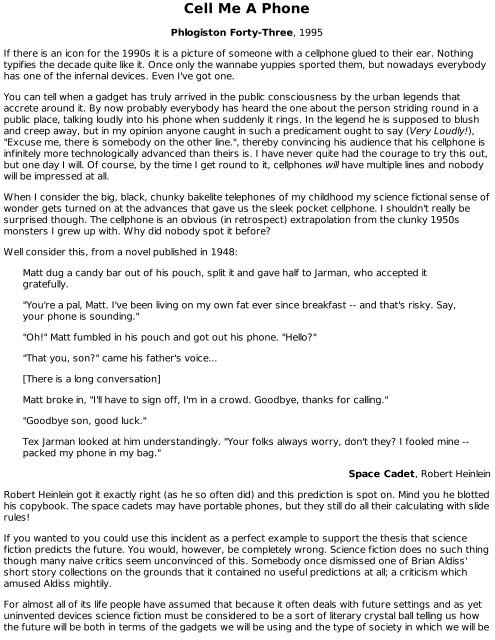Triffids Beard 2 - The Bearded Triffid
Triffids Beard 2 - The Bearded Triffid
Triffids Beard 2 - The Bearded Triffid
You also want an ePaper? Increase the reach of your titles
YUMPU automatically turns print PDFs into web optimized ePapers that Google loves.
Cell Me A Phone<br />
Phlogiston Forty-Three, 1995<br />
If there is an icon for the 1990s it is a picture of someone with a cellphone glued to their ear. Nothing<br />
typifies the decade quite like it. Once only the wannabe yuppies sported them, but nowadays everybody<br />
has one of the infernal devices. Even I've got one.<br />
You can tell when a gadget has truly arrived in the public consciousness by the urban legends that<br />
accrete around it. By now probably everybody has heard the one about the person striding round in a<br />
public place, talking loudly into his phone when suddenly it rings. In the legend he is supposed to blush<br />
and creep away, but in my opinion anyone caught in such a predicament ought to say (Very Loudly!),<br />
"Excuse me, there is somebody on the other line.", thereby convincing his audience that his cellphone is<br />
infinitely more technologically advanced than theirs is. I have never quite had the courage to try this out,<br />
but one day I will. Of course, by the time I get round to it, cellphones will have multiple lines and nobody<br />
will be impressed at all.<br />
When I consider the big, black, chunky bakelite telephones of my childhood my science fictional sense of<br />
wonder gets turned on at the advances that gave us the sleek pocket cellphone. I shouldn't really be<br />
surprised though. <strong>The</strong> cellphone is an obvious (in retrospect) extrapolation from the clunky 1950s<br />
monsters I grew up with. Why did nobody spot it before?<br />
Well consider this, from a novel published in 1948:<br />
Matt dug a candy bar out of his pouch, split it and gave half to Jarman, who accepted it<br />
gratefully.<br />
"You're a pal, Matt. I've been living on my own fat ever since breakfast -- and that's risky. Say,<br />
your phone is sounding."<br />
"Oh!" Matt fumbled in his pouch and got out his phone. "Hello?"<br />
"That you, son?" came his father's voice...<br />
[<strong>The</strong>re is a long conversation]<br />
Matt broke in, "I'll have to sign off, I'm in a crowd. Goodbye, thanks for calling."<br />
"Goodbye son, good luck."<br />
Tex Jarman looked at him understandingly. "Your folks always worry, don't they? I fooled mine -packed<br />
my phone in my bag."<br />
Space Cadet, Robert Heinlein<br />
Robert Heinlein got it exactly right (as he so often did) and this prediction is spot on. Mind you he blotted<br />
his copybook. <strong>The</strong> space cadets may have portable phones, but they still do all their calculating with slide<br />
rules!<br />
If you wanted to you could use this incident as a perfect example to support the thesis that science<br />
fiction predicts the future. You would, however, be completely wrong. Science fiction does no such thing<br />
though many naive critics seem unconvinced of this. Somebody once dismissed one of Brian Aldiss'<br />
short story collections on the grounds that it contained no useful predictions at all; a criticism which<br />
amused Aldiss mightily.<br />
For almost all of its life people have assumed that because it often deals with future settings and as yet<br />
uninvented devices science fiction must be considered to be a sort of literary crystal ball telling us how<br />
the future will be both in terms of the gadgets we will be using and the type of society in which we will be


